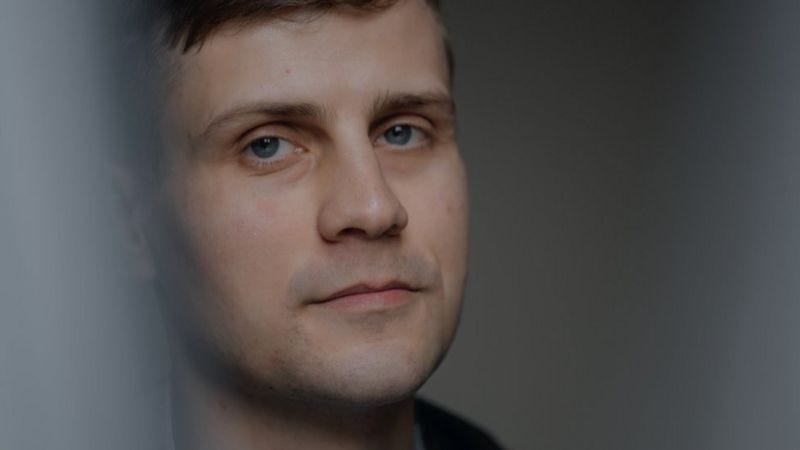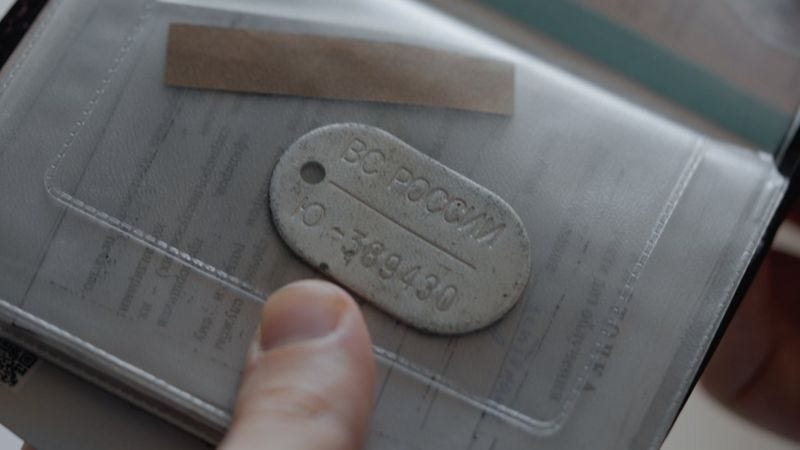LONG READ: Ukrainians aren't my enemy, says Russian pilot who walked away from the war
Dmitry Mishov, the first airforce officer to defect, talks to BBC Russian about corruption, chaos, and low morale in the armed forces, and why he refuses to fight in Ukraine.
By Ilya Barabanov.
On 28 May, as Russia was celebrating Border Guards day, 26-year old helicopter pilot Dmitry Mishov packed his bags and secretly left Russia. He was heading for Lithuania to claim asylum and avoid being sent to fight in Ukraine in a war he says he strongly opposes. BBC Russian special correspondent Ilya Barabanov went to meet him in Vilnius to hear his story.
We meet Dmitry Mishov in a small hotel room. It’s his first time in Europe. He’s been in Vilnius for two days and says he’s been walking around the city in the evenings. He crossed into Lithuania illegally and is feeling nervous. “If I go to a museum will they ask for my passport?” he asks.
He introduces himself in military style: “Dmitry Aleksandrovich Mishov, Lieutenant. Former position – assistant helicopter pilot. Then I became the navigator-commander of a combat helicopter. I served in a unit in Ostrov.” Mishov is referring to Unit No.44440, in a small Russian town in the Pskov region. As part of the 15th Aviation Brigade, Mishov’s unit has been attacking Ukraine since day zero. They have Soviet and Russian-built attack helicopters: Mi-26s, Mi-28s, Mi-35s, Mi-8MTV-5s and the Ka-52 “Alligators.”
BBC is blocked in Russia. We’ve attached the story in Russian as a pdf file for readers there.
“Naturally, I hoped that none of this would happen. But there were signs that it was coming.” Mishov, says remembering the months leading up to the war. “Back in November [2021] reconnaissance of the border territories begun. They started giving us weapons that weren’t normally used in exercises, and armouring the helicopters.”
So the Russian army knew that war was approaching.
Five helicopters and two crews
On the eve of 24 February, when Putin announced the full-scale invasion of Ukraine, Dmitry Mishov was asleep in his barracks in Belarus. He awoke to an order to fly to Hostomel, a big cargo airport on the outskirts of Kyiv. His flight was subsequently cancelled because of the heavy losses Russia was incurring. “At that stage they were still saying there were no losses, but my classmate was killed on the first day. Five helicopters and two crews were lost [at Hostomel.]”
BBC: It’s rather unusual for a military man not to want to fight. An anti-war soldier. How do you feel about the Russian invasion of Ukraine?
“I’m against it. I’m a soldier, my job is to defend my country against aggression. But I must not become an accomplice to this crime. For some reason, they never explained to us why the war started. Why did we have to attack and kill Ukrainians, destroy their cities? Half of Ukrainians have relatives in Russia. It wasn’t so clear why we had to kill them [Ukrainians.] I think it was just to keep one person in power – Putin. He wanted to strengthen his power, he thought it was a good idea at the time.”
Mishov says that the mood in the Russian army can vary – a few of his colleagues strongly favour the war; a few condemn it, but most are just fed up with the fighting conditions and the pay. Most pilots are still on their old salaries (80,000-90,000 roubles a month – around £800) whilst new recruits are being promised 204,000 roubles a month by the Russian state.
Mishov’s campaign to leave the unit dragged on until September, but his request was finally granted. Whilst he waited, the young officer stayed in Pskov and never visited the front. The BBC has a copy of the document signed by Major General Sergei Riumishin, granting Lieutenant Mishov early dismissal from the reserve on 6 September 2022.
Mishov spent the next month on probation as he waited for his name to be officially removed from the list. The BBC has access to a message from the Unit No.44440 commander that Mishov “should consider himself dismissed from 7 October, with the cessation of all payments and the loss of access to official secrets.”
But a happy ending was not to be – Putin announced mobilisation on 21 September.”
By 15 October Mishov’s permission to leave had already been withdrawn by his unit. They called to tell him he was expected back at the squadron base. And on 9 October the higher command of Major General Ruimishin cancelled his release.
Mishov tried to challenge the decision in court in December, but the Pskov garrison court martial sided with his command. The BBC has a copy of the verdict.
I tried everything
“We realised that I’d lost my case. I’d have to go back and serve,” says Mishov. “There were all these amendments to the criminal code – previously, it hadn’t been technically illegal to resign. They took away the choice and started putting pressure on me.”
As a punishment, Mishov’s commander threatened to send him to the front as a foot soldier.
“They forced me to sign a statement, saying I’d bear arms and join a mission on a certain date. That was at the end of January,” remembers Mishov. He had the conversation on 27 January , with his unit planning to dispatch him to the front on the 31st. Mishov spent the weekend weighing up his options – he wanted to avoid combat, but not end up in jail.
“I cut my wrists,” he said, “Not completely, but enough to put me in hospital.”
Mishov hoped that dropping to a lower fitness category would help his case to leave. But it was soon clear that this hadn’t worked either, and the prospect of criminal charges was very real.
After Mishkov injured himself, the commander of the helicopter squadron argued that the gesture was “a crime under Article 339 of the Russian Criminal Code – an attempt to evade service by feigning illness or other means.” The usual punishment for this offense is a six-month sentence – rising to 5-10 years during mobilisation, martial law, or an active war.
“By this point I’d tried everything. When I was in hospital, even the doctor told me it wouldn’t work, they were sending everyone back to their units. I decided to run,” says Mishov.
Lying in the hospital, Mishov read a story online about some people from Pskov who’d managed to flee via Latvia in January 2023. There was a comment from Latvian lawyer and European parliamentary advisor Aleksei Dimitrov – EU law grants asylum to those facing punishment for refusing service during wartime.
“I never thought I’d refuse to serve,” explains Mishov, “I always expected that I’d do my duty if my country was in danger. But I refuse to become an accomplice to this crime. If I was in a combat helicopter, I’d be killing people. I would have killed several dozen people – and I wouldn't want that, the Ukrainians aren’t my enemies.”
Once he’d decided to flee, the lieutenant stayed in hospital working on his plan. “The first thing to do was get myself out of Russia. I’d heard of a group called “Order of the Republic.” Junior officers had told me about these retired officers who were against Putin, that they were helping people. I made contact with them on Telegram – they heard my story and said they’d help.”
“Don’t worry, they said, we’ll take care of everything. And that was what happened. I couldn’t have physically managed it without them, I’d been in hospital for a month and a half. My body was weak. The people who helped me worked out a route, so I’d avoid the hidden border guards.”
BBC Russian has the names of those who helped Mishov to cross the border, but is withholding them for safety reasons.
When Mishov was almost at the border he saw the flash of a nearby signal flare, and then another. “I thought that the hunt was up, I scrambled over the barbed and ran deeper into the forest. There was a third flare behind me.”
Safe on EU territory, Mishov’s rescuers met him and drove him to Vilnius. Mishov remembers how he felt after crossing the border. “Breathing free air at last, it felt so pure and fresh. Until then I felt the threat hanging over me, ten years in jail or worse. I could easily have ended up in prison if the border guards caught me. But afterwards I could breathe again, and I went on with new strength.”
He tells us he discussed his options with his fellow pilots – whether to accept a jail term or run away, but they had advised him to stay in Russia and hide.
BBC: How do you think the rest of your unit will react to your escape? Will there be a search, or a criminal case? Will they see you as a traitor?
“There will almost certainly be a criminal case. They’ll have to open one. As my old colleagues, that’s hard to say. I reckon half of them will understand. When I slit my wrists they realised it was an escape attempt, not a suicide attempt, they knew I didn’t want to fight.”
Reports of corruption
Mishov claims many Russian soldiers don’t understand why they are fighting the war. “They wouldn’t be against a peace settlement, if it meant everything would be over sooner.” But nor does he expect any meaningful acts of sabotage from his former colleagues.
He explains that even in a wartime scenario they put most of their energy into various schemes to obtain money and deceive their commanders. Thus, last November the Ministry of Defence promised a bounty for destroying Ukrainian equipment – 300,000 roubles for every plane; 200,000 for a helicopter, 100,000 for a tank, and 50,000 for a light armoured vehicle.
“Say there is a damaged tank. Several helicopters are firing at it, there are multiple hits – but for a small cut, a gunner will report that each hit destroyed a separate vehicle. So everyone gets the bounty for the same tank,” says the Lieutenant. “Nobody’s happy with the payments they’re getting, and everyone’s trying to make it look like they’re participating in military attacks, even when they’re not. Sometimes they’d be on Russian territory, but they’d still try to make it look like they were in Melitopol or wherever [in Ukraine.]”
BBC: And what do the troops think of General Konashenkov’s daily reports, where he destroys entire Ukrainian arsenals?
“Nobody believes those. They know what’s going on. Maybe civilians are taken in, but everyone at the front knows it isn’t true. I think the statistics are due to soldiers overreporting successes to get the bounty. They call their commanders and say – it’s all fine here, we destroyed these strongholds, that equipment, and this many units. And Konashenkov just puts it all together. It’s like I told you – the same tank is blown up many times!”
Corruption solves everything, says Mishov, recalling his years at Syzran Aviation Academy. On one occasion, the director forced the teachers to pay the 2 million roubles he owed the bank. “He just forced everyone to chip in.”
According to Mishov, neither soldiers nor officers believe the television propaganda. “They don’t even believe we’re fighting for a just cause. They don’t think there are Nazis and fascists in Ukraine, or that they were preparing to attack us. It was only the commander of my unit who told me, we’re fighting for the Motherland here. And if everyone refused to fight, like you, we’d all be captured and hanged on poles.” The commander was “strongly aware” of Mishov’s wish to resign, and threatened to jail him. A recording of this conversation is held by the BBC.
If Mishov had been able to quit last summer, he would have tried to avoid mobilisation and not returned to the army. However, “they don’t want to let young officers go,” and consistently delayed the process.
At the end of October, when Mishov was forced to return to his unit, Ukrainian saboteurs destroyed two Ka-52 helicopters at Veretye airfield. “I’d just got back to the unit, it happened at night. Everyone was alerted. Two helicopters were completely burned, and there was one Mi-28 that was still salvageable.” The commander searched all the soldiers, believing one of them had helped the saboteurs, but found nothing. Several days later, they found explosives in the cockpit of another helicopter, which had failed to detonate.
BBC: In your opinion, how prepared were the Russian army for this war? Everyone was talking about “the world’s second best army.”
“Completely unprepared. Looking back to the preparations for 24 February, nobody knew exactly what they were doing. Our helicopters were supposed to have heat traps [IRCMs] which shoot back and repel missiles. And we never got them. Half the helicopters were faulty, some didn’t have working equipment, or no missiles. So they flew as they were. I think the command thought everything was fine, but it was all for show. The reports they sent to their bosses don’t line up with reality at all – not enough missiles or rations, broken helicopters.”
When the war started, do you think they were really counting on a three-day “blitz”?
“Yes. Absolutely. The plan was to send us to Hostomel airport, and they would send “Ils” [Ilushin cargo planes] with paratroopers after us. But there were so many losses that they never sent the Ils, and later they had to pull all the troops from Kyiv. I think they thought they could take Kyiv quickly.”
Ten years of Afghanistan in one year
When the Russian army retreated from Kyiv they left the traces of many war crimes in the suburbs of Bucha, Borodianka, and Irpin. Mishov says that he didn’t personally witness any war crimes, but he discussed the news with his colleagues. They believed all the crimes were committed by the Russian military – and some were involved.
Mishov knew a pilot who used his helicopter to transport household items looted from this region. “My acquaintance carried away these “trophies,” which were just ordinary Ukrainian household goods, sometimes quad-bikes or motorbikes. Those who were in on it saw them as trophies, and they talked about them as if they were trophies. Of course, to those of us who weren’t, it was a crime – but amongst themselves they were marauders, these were their spoils.”
Amongst themselves, the pilots also discussed the “regrouping” of Russian troops in Kharkiv and the retreat from Kherson. “We had these kinds of conversations - will they abandon Kherson or not? Because everyone liked to say, Russia will be here forever. Then it became clear that Kherson would be left behind. People were neutral, some even joked about it. And a few were glad that the city was being left in peace. Because who needs that piece of DPR-LPR land? [Kherson is in Ukraine.] The army certainly don’t need it.”

Mishov’s regiment have lost 20 percent of its helicopters during the war. Previously, they had 40 to 50 – out of which two were destroyed by saboteurs, and six or seven more were shot down at the front. “These are significant losses. If we look at, say, Afghanistan, I know [the Soviet army] lost 333 helicopters. It’s like we’ve had ten years of Afghanistan in one year.”
The lieutenant believes the Russian army might solve its helicopter issues, but will struggle to cope with the shortfall in qualified pilots. A pilot like Mishov escaping to Vilnius costs the army dearly – and it can take five years to train another. “Foot soldiers are one thing, but pilots – ” says Mishov. “I guess they’ll copy Wagner’s example, recruit some older guys who’ve served before and bribe them with cash.”
Mishov doesn’t have a plan for his future yet, but he doesn’t want to fight in any army. He plans to “build a new life, and study.” He knows settling in the EU will be a hard legal process, but justifies it to himself: “There was no choice, really. I could go to war – against my conscience – go to prison, or I could take my chances here. I think staying here is the better option. Even if something goes wrong, it’s much better than a life under threat in Russia.”
An abridged version of this story was published on Monday the BBC News site.
Read the full story in Russian here.
Edited by Anastasia Lotareva.
Translated by Pippa Crawford.
The shocking scale of theft in the Russian army
By Andrei Zakharov Troops newly-mobilised for the war in Ukraine are being forced to pay for their own kit as army supply depots run low on everything from uniforms and boots, to flak-jackets and night-vision equipment. As questions are asked in the Russian Duma about w…











